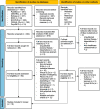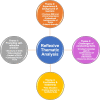Exploring in-person self-led debriefings for groups of learners in simulation-based education: an integrative review
- PMID: 38229166
- PMCID: PMC10790376
- DOI: 10.1186/s41077-023-00274-z
Exploring in-person self-led debriefings for groups of learners in simulation-based education: an integrative review
Abstract
Background: Facilitator-led debriefings are well-established for debriefing groups of learners in immersive simulation-based education. However, there has been emerging interest in self-led debriefings whereby individuals or groups of learners conduct a debriefing themselves, without the presence of a facilitator. How and why self-led debriefings influence debriefing outcomes remains undetermined.
Research aim: The aim of this study was to explore how and why in-person self-led debriefings influence debriefing outcomes for groups of learners in immersive simulation-based education.
Methods: An integrative review was conducted, searching seven electronic databases (PubMed, Cochrane, Embase, ERIC, SCOPUS, CINAHL Plus, PsychINFO) for peer-reviewed empirical studies investigating in-person self-led debriefings for groups of learners. Data were extracted, synthesised, and underwent reflexive thematic analysis.
Results: Eighteen empirical studies identified through the search strategy were included in this review. There was significant heterogeneity in respect to study designs, aims, contexts, debriefing formats, learner characteristics, and data collection instruments. The synthesised findings of this review suggest that, across a range of debriefing outcome measures, in-person self-led debriefings for groups of learners following immersive simulation-based education are preferable to conducting no debriefing at all. In certain cultural and professional contexts, such as postgraduate learners and those with previous debriefing experience, self-led debriefings can support effective learning and may provide equivalent educational outcomes to facilitator-led debriefings or self-led and facilitator-led combination strategies. Furthermore, there is some evidence to suggest that self-led and facilitator-led combination approaches may optimise participant learning, with this approach warranting further research. Reflexive thematic analysis of the data revealed four themes, promoting self-reflective practice, experience and background of learners, challenges of conducting self-led debriefings and facilitation and leadership. Similar to facilitator-led debriefings, promoting self-reflective practice within groups of learners is fundamental to how and why self-led debriefings influence debriefing outcomes.
Conclusions: In circumstances where simulation resources for facilitator-led debriefings are limited, self-led debriefings can provide an alternative opportunity to safeguard effective learning. However, their true value within the scope of immersive simulation-based education may lie as an adjunctive method alongside facilitator-led debriefings. Further research is needed to explore how to best enable the process of reflective practice within self-led debriefings to understand how, and in which contexts, self-led debriefings are best employed and thus maximise their potential use.
Keywords: Debriefing; Facilitator-led debriefing; Immersive simulation; Self-debriefing; Self-led debriefing; Simulation-based education.
© 2024. The Author(s).
Conflict of interest statement
The authors declare that they have no competing interests.
Figures
References
LinkOut - more resources
Full Text Sources



